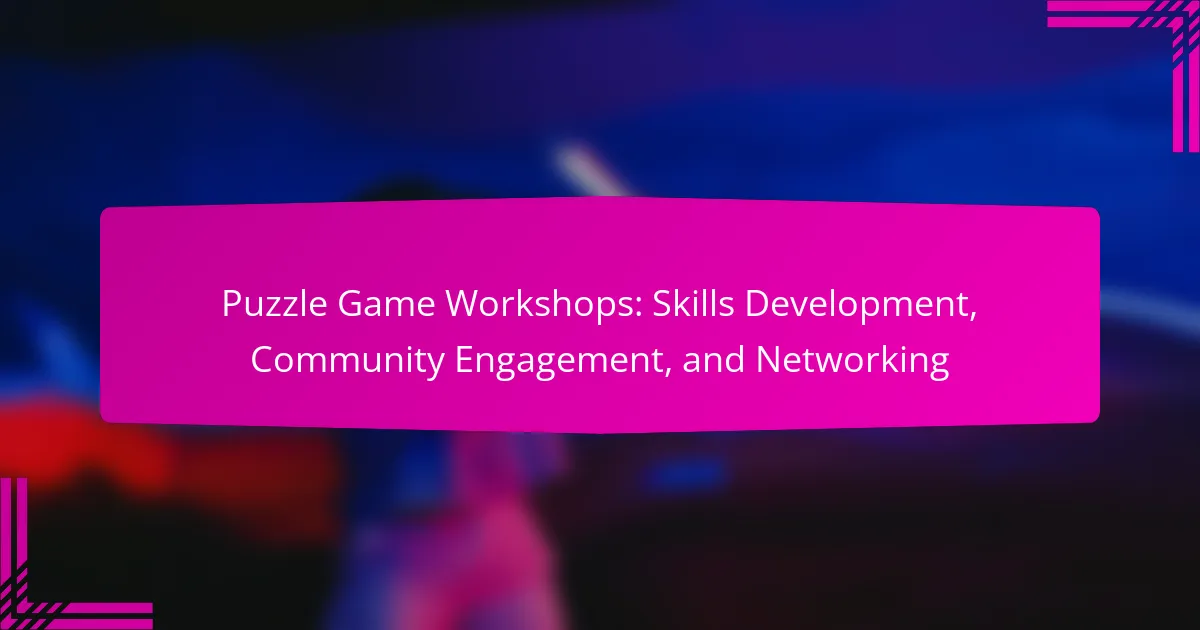Puzzle game workshops enhance critical thinking, problem-solving, and teamwork skills. They foster community engagement through collaboration and networking opportunities. Participants connect with industry professionals and share strategies, enriching their personal and professional growth. Successful workshops focus on clear objectives, diverse activities, and participant feedback to create an engaging environment.
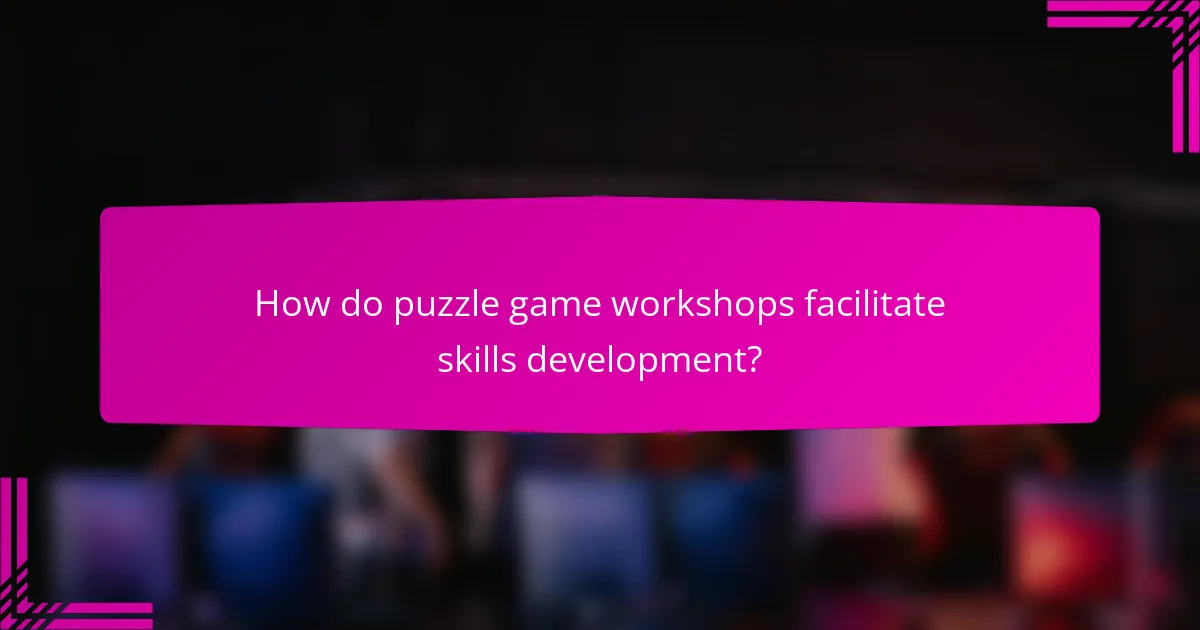
How do puzzle game workshops facilitate skills development?
Puzzle game workshops enhance skills development by fostering critical thinking, problem-solving, and teamwork. Participants engage in collaborative challenges that require strategic planning and effective communication. These workshops also promote creativity, as players must devise unique solutions to complex puzzles. Additionally, attendees build a sense of community, creating networks that can support personal and professional growth.
Which skills are enhanced through participation in puzzle game workshops?
Participation in puzzle game workshops enhances critical thinking, problem-solving, teamwork, creativity, and communication skills. These workshops foster a collaborative environment, encouraging participants to work together to solve complex puzzles. As a result, individuals develop stronger analytical abilities and learn to approach challenges from multiple perspectives. Networking opportunities within these workshops further enhance social skills, allowing participants to build connections with others who share similar interests.
What teaching methods are commonly used in puzzle game workshops?
Puzzle game workshops commonly utilize interactive and collaborative teaching methods. These methods include hands-on activities, group discussions, and problem-solving sessions that engage participants actively. Workshops often emphasize experiential learning, allowing participants to apply their skills in real-time scenarios, fostering both individual and community development. Additionally, instructors may use feedback loops to enhance learning and adapt to the needs of the group.
How do different age groups benefit from puzzle game workshops?
Different age groups benefit from puzzle game workshops by enhancing cognitive skills, fostering social interactions, and building community ties.
Children improve problem-solving abilities and teamwork skills through collaborative gameplay. Adolescents develop critical thinking and strategic planning while engaging with peers. Adults benefit from stress relief and mental agility, promoting overall well-being. Seniors enhance memory and cognitive function, encouraging social engagement.
Each age group experiences unique advantages, reinforcing the importance of puzzle game workshops in diverse settings.
What role does feedback play in skill enhancement during workshops?
Feedback is crucial for skill enhancement during puzzle game workshops. It provides participants with insights into their performance and areas for improvement. Constructive feedback fosters a supportive learning environment, encouraging collaboration and community engagement. Participants can refine their strategies and problem-solving techniques based on peer and instructor assessments. This iterative process not only boosts individual skills but also strengthens connections within the community.
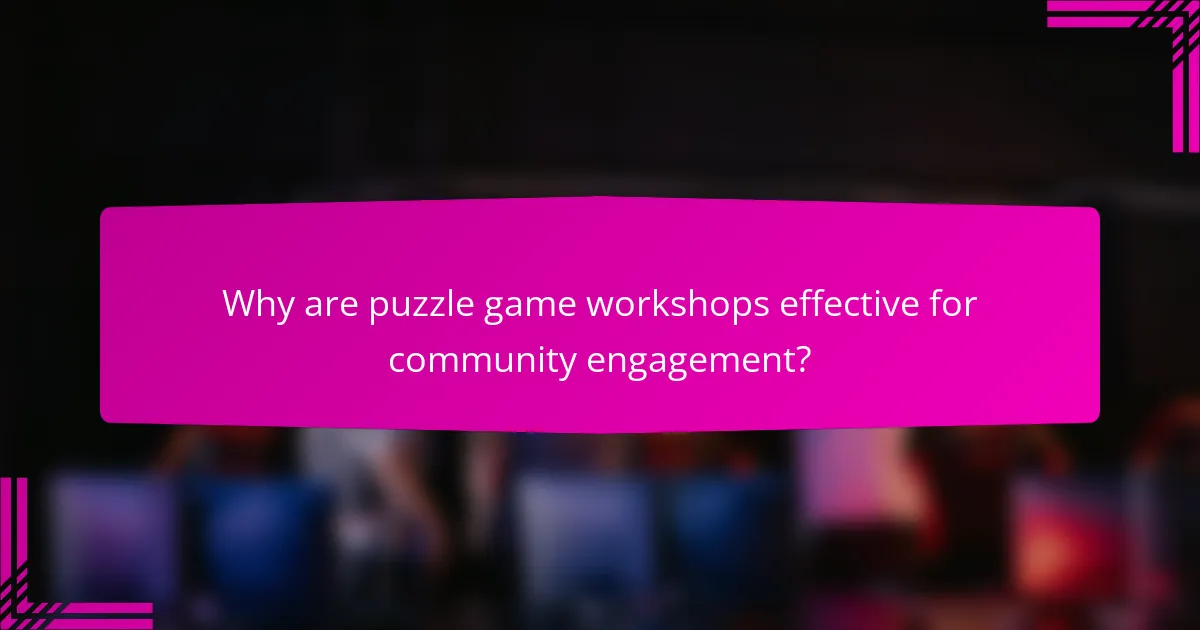
Why are puzzle game workshops effective for community engagement?
Puzzle game workshops are effective for community engagement because they foster collaboration, enhance problem-solving skills, and create networking opportunities. Participants work together to solve challenges, promoting teamwork and communication. These workshops also attract diverse groups, enhancing social connections. As a result, they build a sense of belonging and community spirit. Engaging in puzzle-solving can lead to improved cognitive skills, which benefits individuals and their interactions within the community.
How do puzzle game workshops foster social connections among participants?
Puzzle game workshops foster social connections by encouraging teamwork and collaboration. Participants engage in problem-solving activities that require communication and strategy sharing. These interactions build relationships and create a sense of community. Additionally, workshops often include social events, enhancing networking opportunities. The unique environment of puzzle games promotes inclusivity, allowing diverse individuals to connect over shared interests.
What types of community events can be organized around puzzle game workshops?
Puzzle game workshops can host various community events to enhance skills and networking. These include tournaments, collaborative puzzle-solving sessions, themed game nights, and skill-sharing workshops. Each event fosters engagement and strengthens community bonds while promoting problem-solving skills.
How do puzzle game workshops promote inclusivity and diversity in communities?
Puzzle game workshops foster inclusivity and diversity by creating accessible environments for participants. These workshops encourage collaboration among individuals from various backgrounds, promoting teamwork and communication skills. Participants often share unique perspectives, enriching the gaming experience. Additionally, puzzle games can bridge cultural gaps, allowing diverse groups to connect through shared challenges. The interactive nature of these workshops helps build a sense of community, fostering relationships that extend beyond the games themselves.
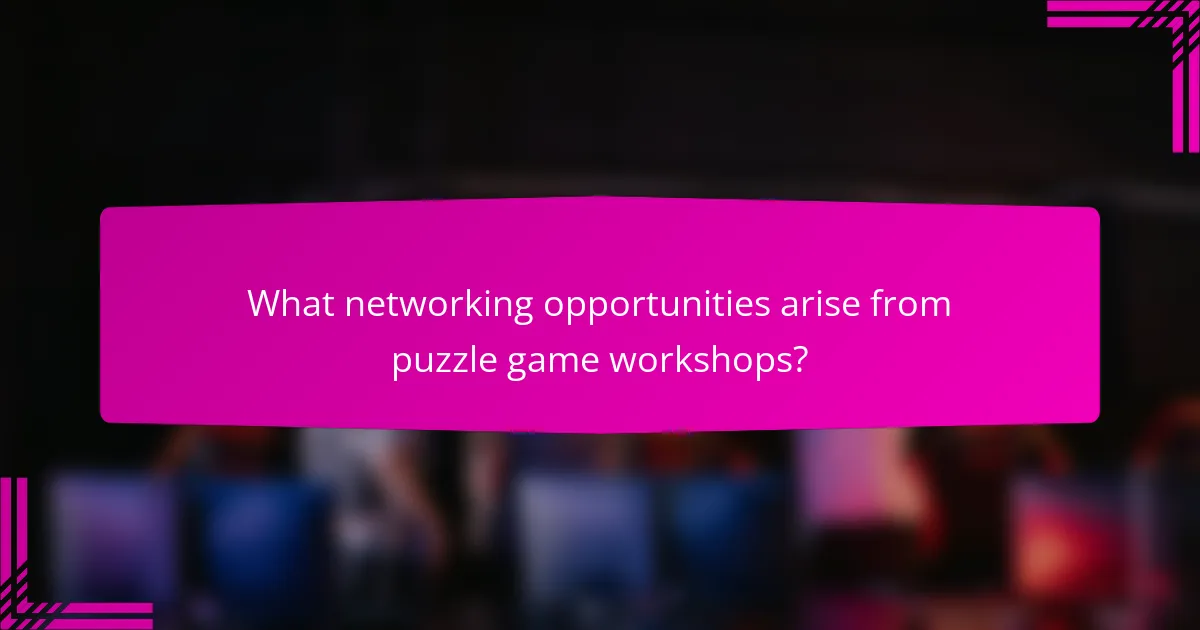
What networking opportunities arise from puzzle game workshops?
Puzzle game workshops offer diverse networking opportunities that enhance collaboration and community building. Participants can connect with like-minded individuals, industry professionals, and game developers. These interactions can lead to mentorship, partnerships, and potential job opportunities. Engaging in team-based challenges fosters relationships that extend beyond the workshop, creating a supportive network for future projects. Additionally, sharing experiences and strategies promotes knowledge exchange, enriching the community’s skill set.
How can participants leverage connections made during workshops for career growth?
Participants can leverage connections made during workshops for career growth by actively engaging with peers and mentors. Building relationships fosters collaboration and opens doors to new opportunities. Networking can lead to job referrals, partnerships, and access to industry insights. Engaging in follow-up conversations strengthens these connections, making participants memorable within their professional circles. Additionally, sharing skills learned in workshops can position participants as valuable assets in their fields.
Which industries benefit from networking at puzzle game workshops?
Several industries benefit from networking at puzzle game workshops, including education, technology, entertainment, mental health, and team-building sectors.
Education professionals gain insights into cognitive development and engagement strategies. Technology companies explore innovative game design and programming techniques. Entertainment industry representatives connect for potential collaborations in game development. Mental health professionals utilize puzzles for therapeutic practices and community engagement. Team-building organizations draw on networking to enhance group dynamics and problem-solving skills.
What are the long-term impacts of networking in puzzle game communities?
Networking in puzzle game communities fosters long-term impacts such as enhanced problem-solving skills, increased collaboration, and lasting friendships. Participants often develop critical thinking abilities through shared strategies and experiences. Community engagement promotes a supportive environment, encouraging players to exchange ideas and improve their gameplay. This interaction leads to unique opportunities for mentorship and skill-sharing, creating a rich tapestry of knowledge within the community. As a result, members are more likely to stay active and engaged over time, contributing to the community’s growth and resilience.
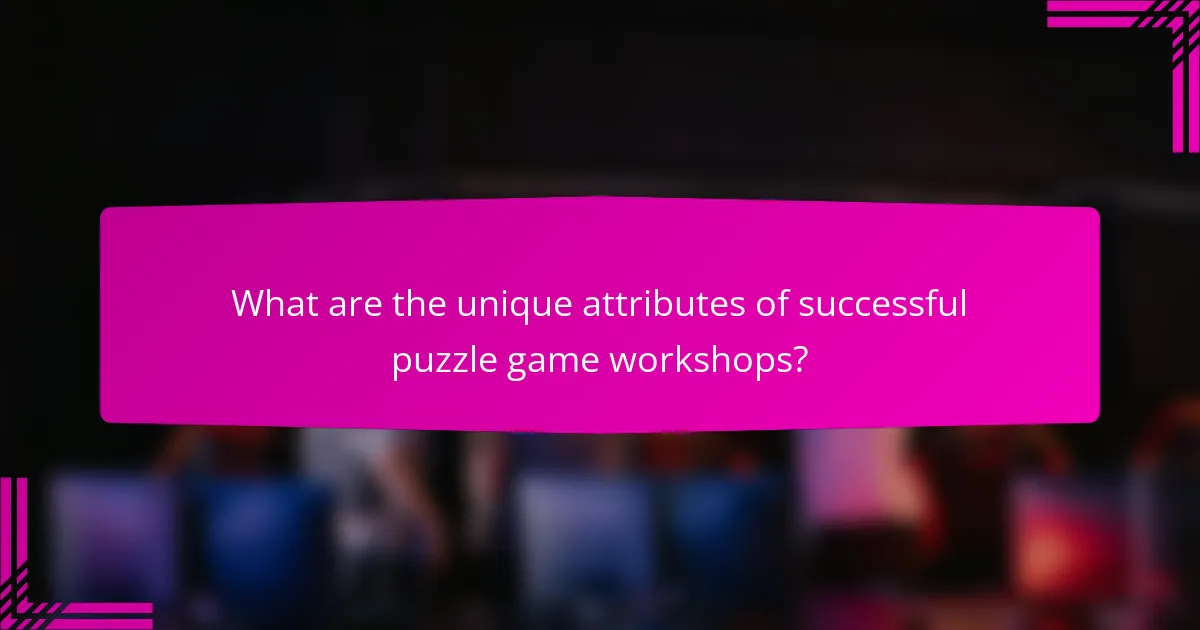
What are the unique attributes of successful puzzle game workshops?
Successful puzzle game workshops possess unique attributes that enhance skills development, foster community engagement, and promote networking. These workshops often feature expert facilitators who provide tailored guidance, ensuring participants gain practical skills relevant to puzzle design and gameplay.
Additionally, a strong emphasis on collaboration creates an engaging environment where attendees share ideas and strategies. Workshops frequently include diverse activities, such as team challenges and hands-on projects, which cater to various skill levels.
Networking opportunities are another key attribute, as participants connect with industry professionals and fellow enthusiasts, expanding their contacts and resources. Lastly, workshops often incorporate feedback sessions, allowing attendees to refine their work and learn from others’ experiences.
How do workshop themes influence participant engagement and learning?
Workshop themes significantly enhance participant engagement and learning by creating relatable contexts and shared objectives. Engaging themes, such as puzzle games, foster collaboration and problem-solving skills. Participants are more likely to immerse themselves in activities that align with their interests, leading to deeper learning experiences.
The choice of theme can also influence networking opportunities. For instance, puzzle game workshops encourage teamwork, allowing participants to connect over shared challenges. This interaction builds a sense of community that enhances both engagement and retention of skills learned during the workshop.
Furthermore, the thematic focus can cater to different learning styles. Visual learners may benefit from the visual aspects of puzzle games, while kinesthetic learners engage through hands-on problem-solving. This diversity in engagement strategies can lead to a more inclusive learning environment.
Ultimately, well-chosen workshop themes can drive motivation, enhance collaboration, and foster a supportive community, all of which contribute to a successful learning experience.
What role does technology play in enhancing puzzle game workshops?
Technology significantly enhances puzzle game workshops by facilitating interactive learning and collaboration. Digital tools enable participants to engage with puzzles in innovative ways, fostering critical thinking and problem-solving skills. Online platforms allow for remote participation, broadening community engagement and networking opportunities. Additionally, technology provides analytics to track progress and tailor experiences, ensuring that workshops meet diverse learning needs effectively.
How do facilitators’ backgrounds affect the success of workshops?
Facilitators’ backgrounds significantly influence the success of puzzle game workshops. Their expertise and experiences shape the workshop’s structure, engagement level, and overall impact on participants.
Facilitators with diverse backgrounds bring unique perspectives, enhancing creativity and problem-solving skills among participants. For instance, those with educational expertise can effectively teach strategies, while facilitators with community-building experience can foster networking opportunities.
Moreover, facilitators’ familiarity with puzzle games directly affects the workshop’s dynamics. Experienced facilitators can adapt activities to suit varying skill levels, ensuring all participants feel included and challenged. This adaptability promotes a positive learning environment.
Finally, facilitators’ networks can expand opportunities for collaboration and resources, benefiting participants long after the workshop ends. Their connections can lead to additional workshops, community events, or partnerships, enhancing the overall value of the experience.
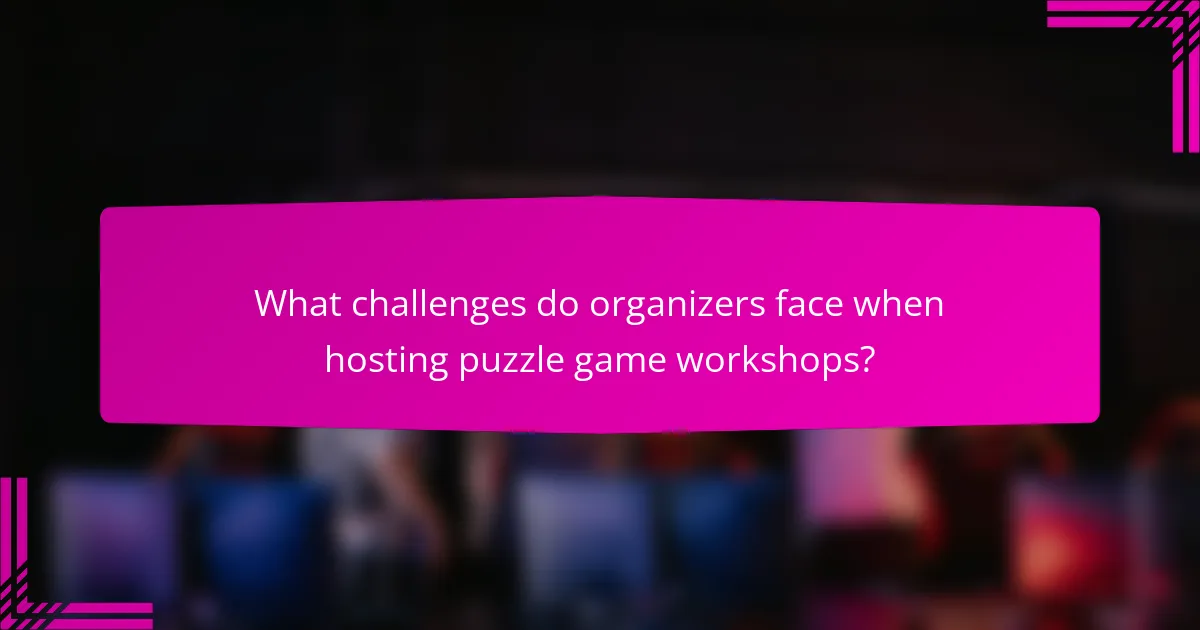
What challenges do organizers face when hosting puzzle game workshops?
Organizers face several challenges when hosting puzzle game workshops, including logistics, participant engagement, and resource allocation. Effective planning is crucial to ensure a smooth experience.
Logistical issues often arise, such as securing a suitable venue and managing time constraints. Organizers must also consider the availability of necessary materials and equipment, which can impact the overall quality of the workshop.
Engaging participants can be difficult, especially if they have varying skill levels. Organizers need to create a welcoming environment that encourages collaboration and communication among attendees.
Resource allocation is another challenge. Organizers must balance budgets while providing adequate tools and support for participants. This includes ensuring access to diverse puzzle types that cater to different interests and abilities.
How do budget constraints impact the quality of puzzle game workshops?
Budget constraints significantly limit the quality of puzzle game workshops by restricting resources for materials, expert facilitators, and venue options. These limitations can reduce participant engagement and hinder the development of essential skills. Workshops with tighter budgets may offer fewer interactive activities, which are crucial for effective learning. Additionally, limited funding can impact marketing efforts, resulting in lower attendance and diminished community engagement. Overall, financial restrictions directly affect the overall experience and outcomes of puzzle game workshops.
What logistical issues commonly arise during puzzle game workshops?
Logistical issues in puzzle game workshops often include inadequate space, insufficient materials, poor time management, and technical difficulties. These challenges can hinder participation and reduce the overall effectiveness of the event. For example, limited seating may restrict engagement, while missing puzzle components can disrupt gameplay. As a result, careful planning is essential to ensure a smooth experience for all participants.
How can organizers effectively market their puzzle game workshops?
Organizers can effectively market their puzzle game workshops by leveraging social media, community partnerships, and targeted advertising. Highlight the skills development and community engagement aspects to attract participants. Utilize platforms like Facebook and Instagram to showcase workshop activities and participant testimonials. Collaborate with local businesses or schools to reach a wider audience and create a sense of community. Additionally, consider offering early bird discounts or referral incentives to encourage sign-ups.
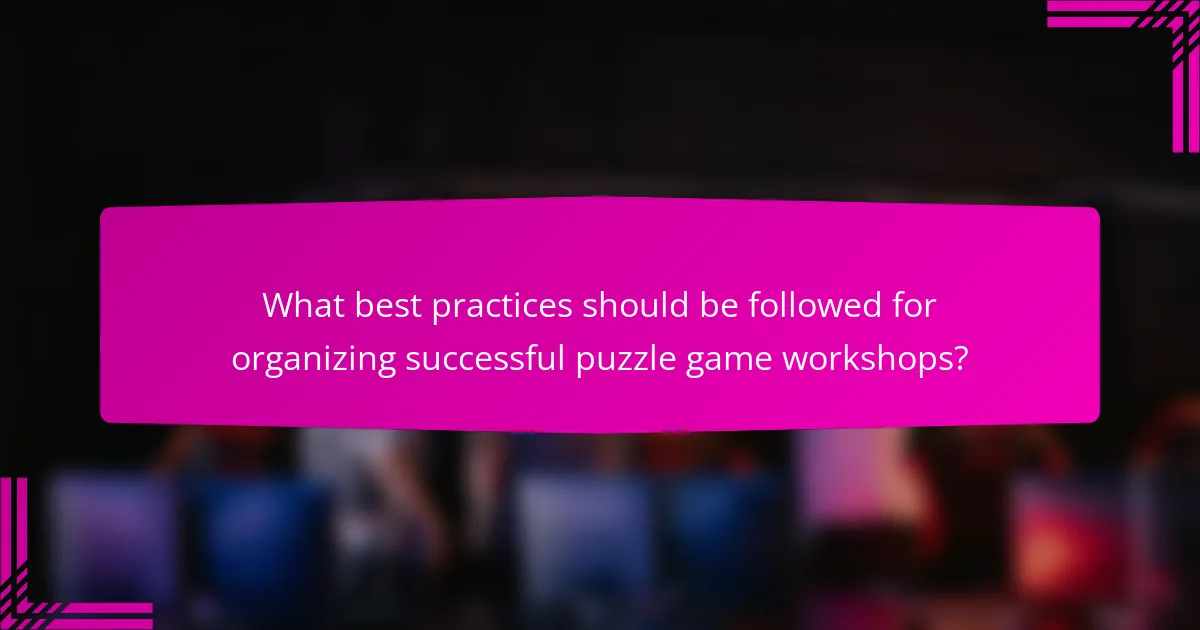
What best practices should be followed for organizing successful puzzle game workshops?
To organize successful puzzle game workshops, focus on clear objectives, engaging activities, and community involvement. Establish a welcoming environment that encourages collaboration and creativity.
1. Define the workshop goals, such as skill enhancement or networking opportunities.
2. Select diverse puzzle types to cater to various skill levels and interests.
3. Incorporate interactive elements, like team challenges, to foster engagement.
4. Promote networking by scheduling breaks and social activities for participants to connect.
5. Gather feedback post-workshop to improve future events and address participant needs.
How can feedback be effectively gathered from participants after workshops?
To effectively gather feedback from participants after puzzle game workshops, utilize surveys, focus groups, and one-on-one interviews. Surveys provide quantitative data on participant satisfaction and skill development. Focus groups encourage discussion on community engagement and networking experiences. One-on-one interviews yield in-depth insights into individual perspectives. Combining these methods offers a comprehensive understanding of workshop effectiveness and areas for improvement.
What strategies can enhance participant retention in future workshops?
To enhance participant retention in future puzzle game workshops, focus on interactive elements and community building. Engaging activities, such as team challenges and collaborative problem-solving, foster a sense of belonging. Regular feedback sessions can help tailor future workshops to participant preferences. Networking opportunities, like informal meetups, strengthen connections among attendees, encouraging repeat participation. Finally, leveraging digital platforms for ongoing engagement can maintain interest between events.
How can facilitators continuously improve their workshop delivery?
Facilitators can continuously improve their workshop delivery by seeking feedback, refining content, and enhancing engagement techniques. Regularly collecting participant feedback helps identify strengths and areas for improvement. Adapting workshop content based on audience needs ensures relevance. Incorporating interactive elements, such as puzzle games, fosters community engagement and networking, enhancing overall participant experience.
